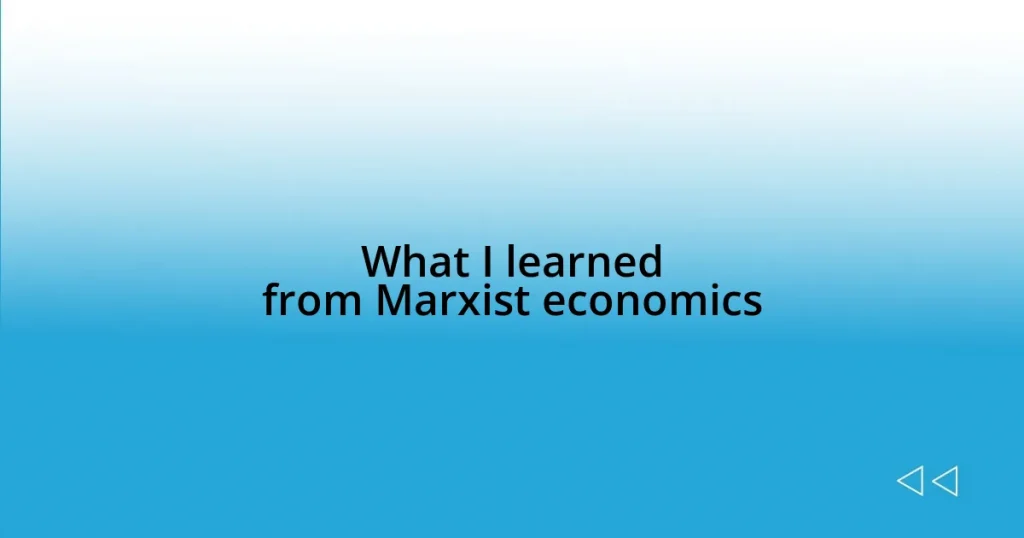Key takeaways:
- Class struggle is a central theme in Marxist economics, highlighting the conflict between different social classes and its impact on workers’ rights and social change.
- The labor theory of value reveals that a product’s worth is tied to the labor required for its production, prompting discussions on wage disparities and compensation fairness.
- Capitalism can drive innovation but often leads to economic inequalities, emphasizing the need for policies that prioritize social well-being and protect workers’ rights.
- Economic policies should actively address class disparities and the voice of the labor force to create a balanced and just society.
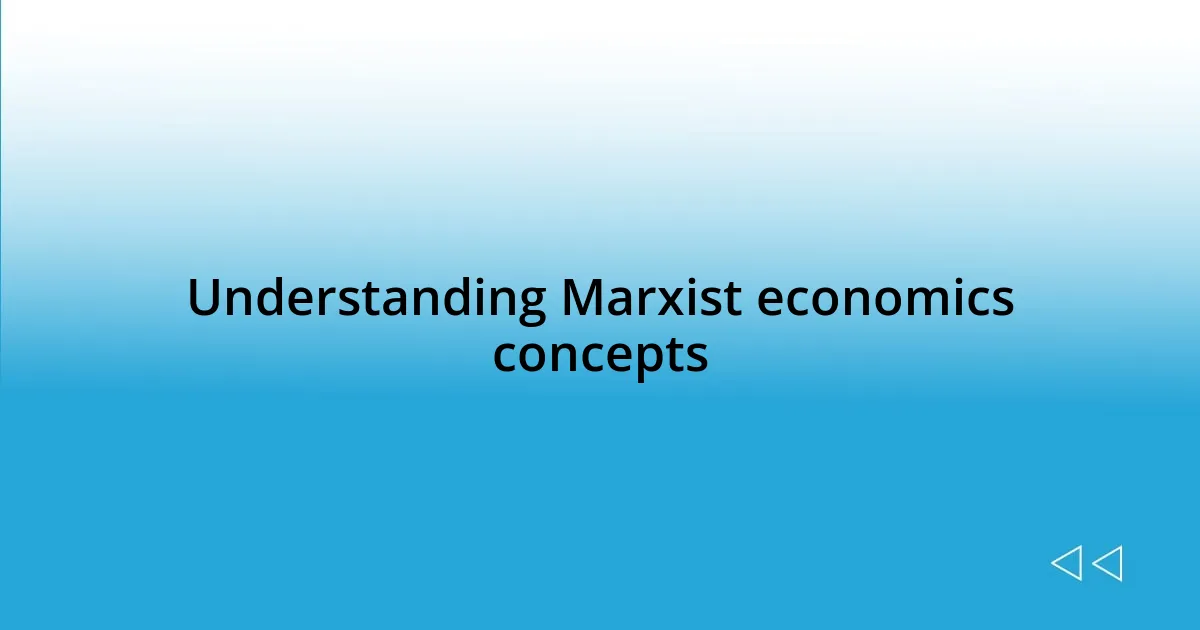
Understanding Marxist economics concepts
Marxist economics hinges on the concept of class struggle, which, to me, sheds light on the dynamics of power in society. I remember discussing this with friends who were skeptical about the relevance of class in today’s world. It made me realize how deeply intertwined our lives are with economic structures, since class divisions can profoundly impact our experiences and opportunities.
Another key idea is the labor theory of value, which suggests that the value of a product is determined by the socially necessary labor time required to produce it. I often found myself pondering, “What makes one worker more valuable than another?” This insight has fueled my understanding of wage disparities and raises essential questions about fairness and compensation in our economy. It emphasizes the relationship between workers and the means of production, provoking thoughts about who truly benefits from their labor.
Then there’s the idea of alienation, which strikes a chord with many people I’ve spoken to. When I think back to my early jobs, I recall feeling detached from the products of my work. It’s not just about dissatisfaction; it’s about the emotional and psychological distance we feel when our labor doesn’t reflect our true interests or passions. This concept invites us to reflect on our work environments and their effects on our well-being.
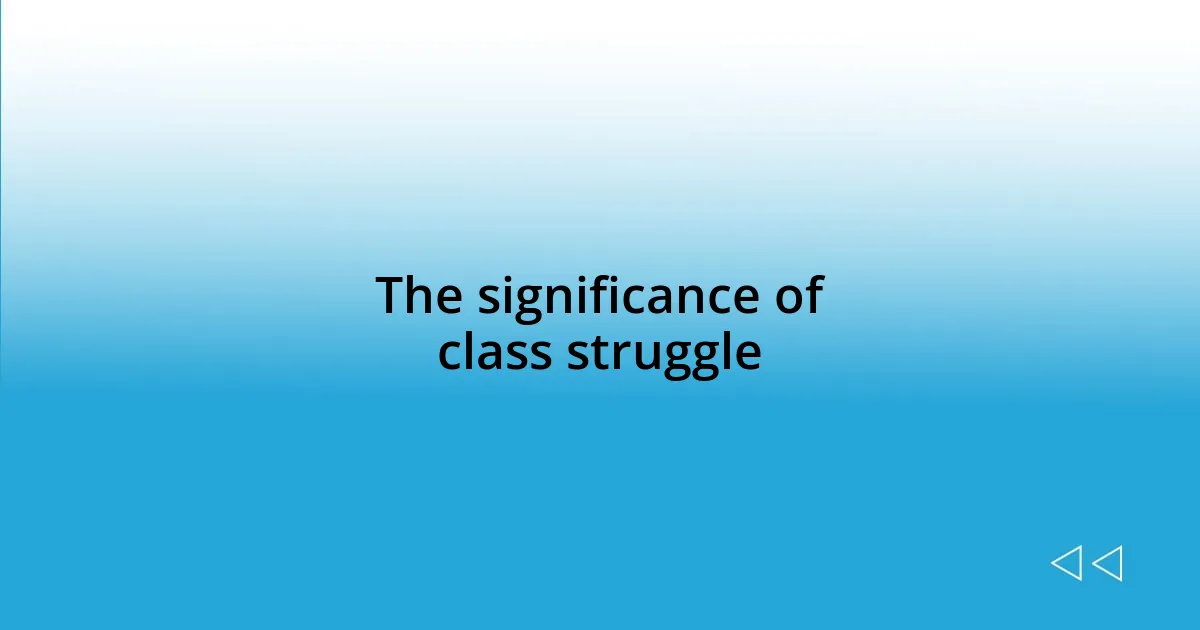
The significance of class struggle
Class struggle represents a fundamental aspect of Marxist economics that highlights the ongoing conflict between different social classes. Reflecting on my own experiences within various workplace environments, I’ve often felt the tension between management and employees. For instance, when working at a retail job, it was clear how decisions made by those at the top affected the daily lives of frontline workers. This dynamic made me realize that class struggle isn’t just theoretical; it’s an everyday reality that shapes our interactions and experiences.
Moreover, the concept serves as a reminder that societal change is often birthed from this struggle. I’ve witnessed protests advocating for workers’ rights, and it was empowering to see collective action challenge the status quo. It makes me think, how many changes in labor laws have stemmed from the push of individuals standing together, demanding better treatment? This struggle is crucial as it fosters solidarity and drives social progress, reminding us that unity can lead to significant changes in our economic landscape.
Finally, class struggle invites us to examine our roles within this ongoing narrative. When I volunteered at a local community center, I noticed how economic inequalities affected different families’ access to resources. It made me realize how essential it is to address these disparities actively. Every small action contributes to the broader picture of social justice and equity. Understanding this significance helps me feel more connected to a larger movement towards change.
| Class Struggle Aspect | Personal Reflection |
|---|---|
| Conflict between classes | Felt tension in retail jobs between employees and management. |
| Driving societal change | Witnessed collective actions leading to improved workers’ rights. |
| Active role in the narrative | Volunteering highlighted economic disparities in access to resources. |
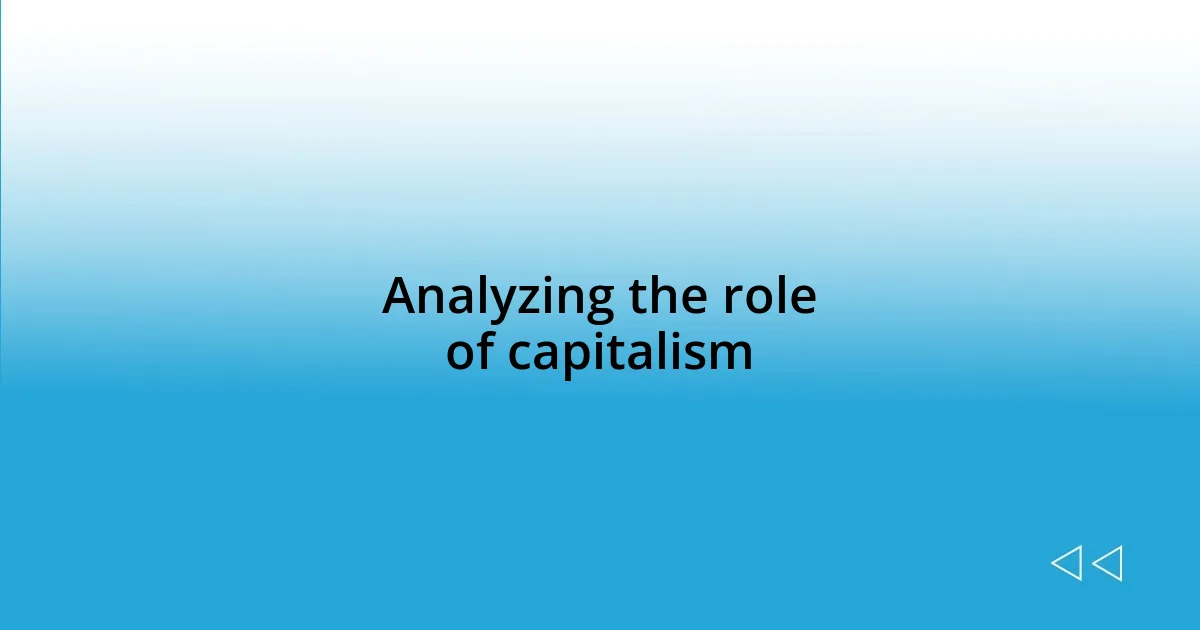
Analyzing the role of capitalism
Capitalism plays a distinctive role in shaping socioeconomic dynamics, largely through the mechanisms of market competition and profit maximization. When I think of my experiences as a consumer, I recognize that my purchasing decisions often reflect a larger societal pattern where wealth tends to concentrate among a few. For example, during my college years, I took part-time jobs to support myself. I noticed how much of my income went to large corporations that prioritized profits over equitable wages. This experience brought home the reality that while capitalism has the power to drive innovation and improve efficiency, it can also exacerbate inequalities, creating a stark divide between the affluent and the working class.
- Capitalism fosters competition, which can lead to consumer benefits through innovation and lower prices.
- However, the profit motive often sidelines social responsibility, leading to wage suppression and worker exploitation.
- My retail job revealed that the success of companies frequently relies on underpaying those who directly contribute to their production and sales.
- This system, while efficient, often results in a wealth gap, causing societal tension between different class groups.
- As I engaged with coworkers who struggled to make ends meet, I felt a deepened awareness of the human cost behind corporate profits.
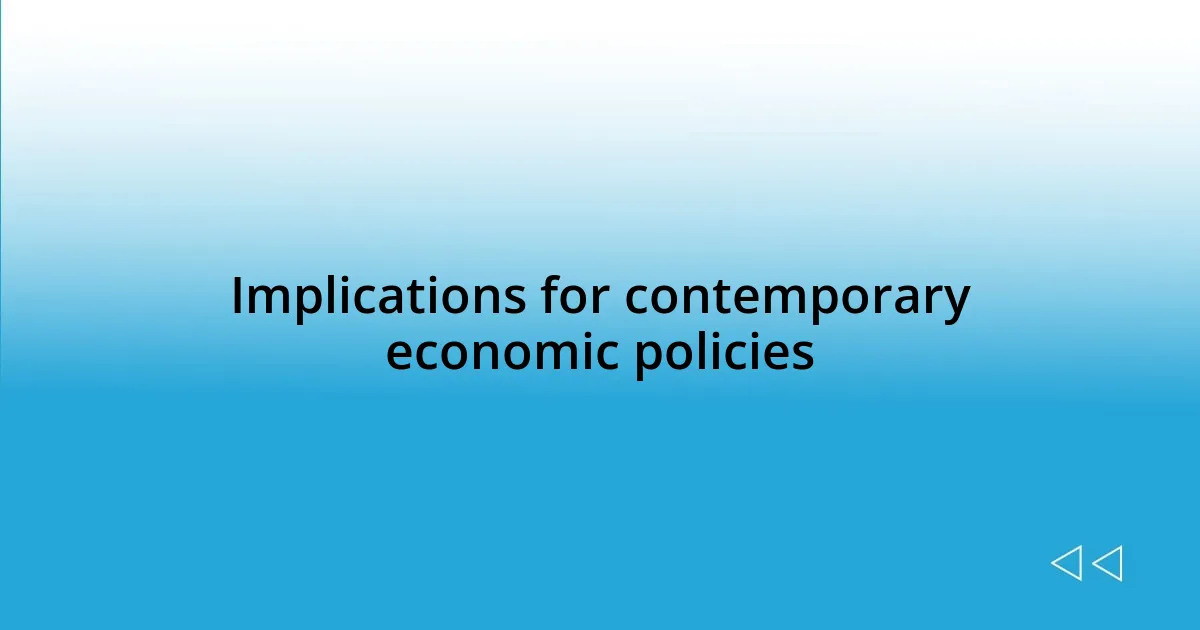
Implications for contemporary economic policies
Contemporary economic policies must grapple with the lessons of Marxist economics, especially in recognizing the effects of class disparity. I remember attending a local town hall meeting where a debate about minimum wage policies took center stage. It struck me how deeply the voices of lower-income workers resonated, emphasizing their struggles to secure a livable wage. Listening to their testimonies made me question: How can policies be designed without genuinely considering the voices of those most affected?
Moreover, modern economic frameworks need to confront the reality that unfettered capitalism can lead to social unrest. During my time volunteering at a food bank, I was astounded by the sheer volume of people relying on its services—many of whom worked multiple jobs but still sank into poverty. This experience highlighted a pressing question: When economic policies prioritize corporate interests over community well-being, what message does that send about societal values?
Finally, as I’ve navigated various job markets, I’ve seen firsthand the implications of economic policies on labor rights. After witnessing a colleague struggle with job insecurity due to temporary contracts, I understood the importance of advocating for policies that protect workers. It left me pondering how effective policies can create a balanced power dynamic between employers and employees, ultimately prompting a fairer distribution of resources. It’s these lived experiences that challenge me to reflect on the policies we shape today.
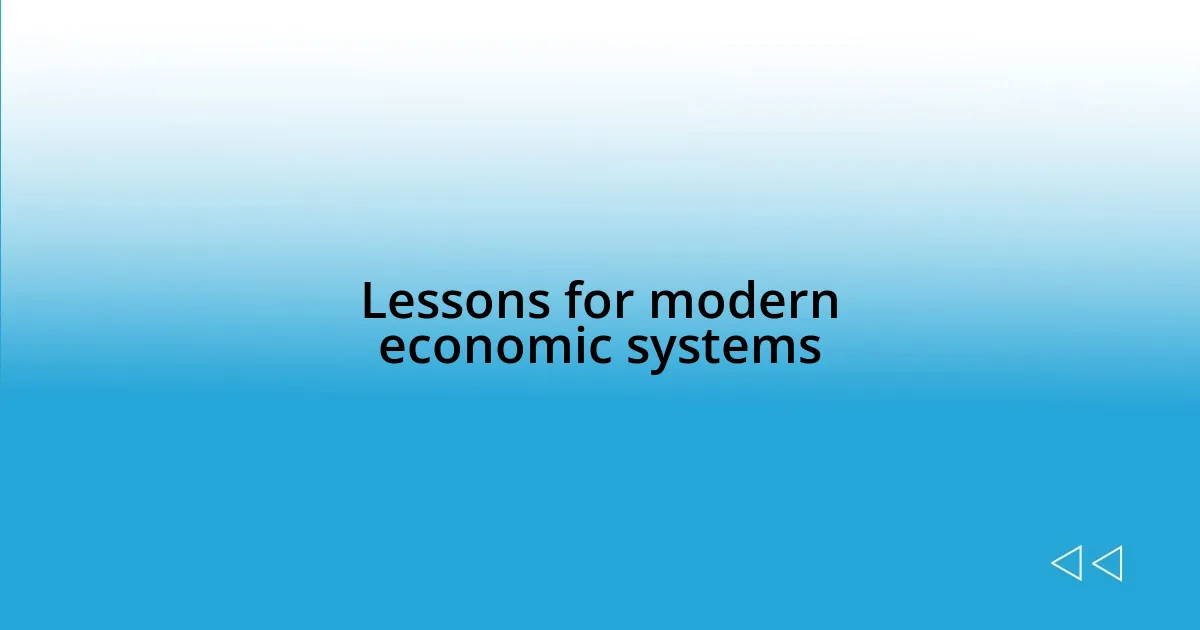
Lessons for modern economic systems
One of the key lessons I’ve gleaned from Marxist economics is the importance of prioritizing social well-being in economic decision-making. I recall a particularly enlightening conversation with a friend who works in a non-profit focused on affordable housing. We discussed how economic policies often seem abstract—void of real-life implications—yet they profoundly affect people’s lives. This made me realize: how can we claim to develop sustainable systems if we overlook the fundamental needs of the most vulnerable in our communities?
It’s also essential to recognize the interconnectedness of workers in any economic system. During my time participating in community organization efforts, I witnessed the power of collective bargaining firsthand. It seemed like a lightbulb moment when we stood together, advocating for fair wages and safe working conditions. I asked myself, what happens to economic health when workers feel powerless? This experience reinforced the idea that a thriving economy cannot ignore the voice of the labor force; their empowerment is crucial for a balanced and just society.
Finally, reflecting on the harsh realities of economic inequality shows that the systems in place often breed discontent. A few years back, I volunteered at a community center where many individuals needed assistance due to job loss. As I listened to their stories, I felt a mix of sadness and anger that systemic failures contributed to their plight. It made me wonder how policy frameworks could better address these realities. Consequently, I believe it’s imperative for modern economic systems to evolve by considering equity and justice, ensuring every individual has a stake in the economy rather than being reduced to mere statistics.











